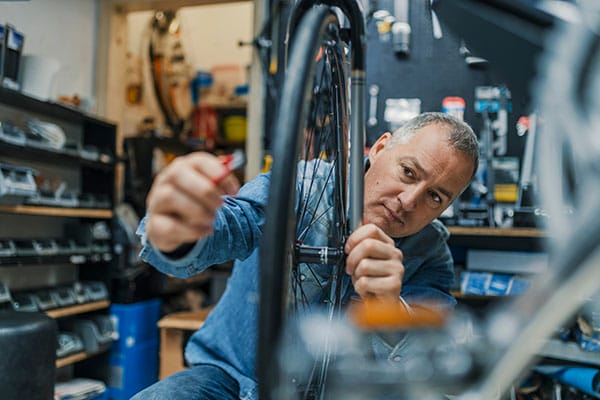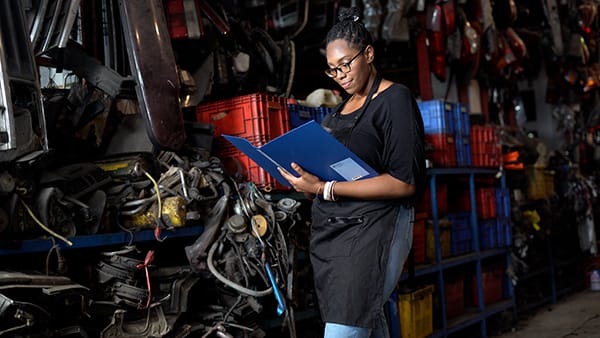Products-Completed Operations
Businesses purchase Commercial General Liability (CGL) policies to protect them against lawsuits and claims arising from their business the products and services their business provides. One coverage included in general liability policies is Products and Completed Operations. But what is it? How does it apply to you?


What Are Products And Completed Operations?
In most insurance plans, a coverage limit is provided for both products and completed operations. This is typically one aggregate limit for both coverages—so yes, they are two separate types of coverage.
The two parts of this dual aggregate are 1) Product coverage and 2) Completed Operations coverage. Both parts may help you pay for legal defense, settlements, or judgments from accidents related to your products, services, or work.
Products Coverage
The products coverage is your products liability insurance. This part provides coverage for bodily injury and property damage arising from the products you imported, manufactured, sold, handled, distributed, or disposed of by you.
This also includes bodily injury and property damage coverage for damages arising from mislabeling or the failure to provide warnings or instructions.
Most insurance policies define product liability injuries and damages as:
- Bodily injuries, illnesses, allergic reactions, and choking
- Accidental death or dismemberment
- Water, fire, electrical, and smoke damage
- Stains, discoloration, tears, and cracks to other property
Completed Operations Coverage
Completed operations coverage provides bodily injury and property damage coverage for claims occurring away from your premises arising out of your work. This coverage is related to those in the contracting and services fields.
Most insurance policies define your work as:
- Work or operations performed by you or on your behalf (such as work done by employees or subcontractors)
- Materials, parts, or equipment furnished in connection with your work or operations
- Warranties or representations made at any time with respect to the fitness, quality, durability, performance, or use of your work
- The providing or failure to provide warnings or instructions
What Is Products-Completed Operations Coverage Good For?
Products-completed operations coverage is good for helping you pay for claims of bodily injury and property damage your products or services may cause. It is also good for meeting contractual requirements.

In regards to the products part of your coverage, product liability claims typically fall into one of three categories:
1. Defectively Manufactured Products
A flawed product because of some error in the manufacturing process causing bodily injury or property damage to a 3rd party.
For example:
- A lithium-ion battery overheats and explodes, causing burns and other injuries
- Stain-resistant apparel caused rashes and other skin irritations
- Tainted food causes illness
- A child’s swing set with a defective chain
2. Defectively Designed Products
Bodily injury and property damage claims and lawsuits arising from defects in the initial design of the product that makes it unsafe for consumers.
For example:
- An iron catches on fire when set on high setting
- A top-heavy piece of furniture easily tips over
- A child’s toy with small detachable items causes choking
- Power strip overheats, causing a fire
3. Failure to Provide Adequate Warnings or Instructions
Bodily Injury or property damage claims and lawsuits arising from inadequate warnings or instruction regarding the proper use of a product.
For example:
- Individual severely sunburned because the product label did not state that the sunscreen needs to be reapplied
- Individual injured because of products advertisement with false claims
- Medication or supplements that do not disclose all the side effects
- Missing label on lawn mower warning injury could occur from rotating blade
In regards to the completed operations part of your coverage, the most common claims falling into one of two categories:
1. Bodily Injuries
This can include injuries, illnesses, allergic reactions, and even death.
For example:
- A contractor builds a deck. Months later the homeowner has a party and the deck collapses, causing injury to multiple guests.
- A cleaning company cleans a customer’s home. Upon the customer’s arrival, they slip on a wet surface left by the cleaners. They break their hip as a result.
- A makeup artist is hired to help a bridal party get ready. A few hours after leaving the venue, they receive a call that a product they used caused one of the clients to break out in a rash.
- A manufacturing business closes down after creating millions of products. An unnoticed defect is now leading to broken pieces that hurt customers upon use.
2. Property Damage
This can include water damage, faulty installation, and fire damage.
For example:
- A handyman installs a wall-mounted television. Weeks later, it fell off the wall causing damage to the new wood floors.
- A plumbing contractor installed a sink. Months later, the fitting blows and floods the house.
- An electrical contractor is hired to wire a commercial building. Years later, the entire building burns down from an electrical fire.
- A landscaper graded homeowner’s land causing the water to flow into the neighbor’s house, flooding the basement.

Who Needs Product-Completed Operations Hazard Coverage?
The main industries that use product-completed operations hazard coverage the most are:
- Manufacturers
- Retailers
- Contractors
- Service Providers
Everyone in the supply and distribution chain can be subject to a product liability claim or lawsuit; importers, manufacturers, wholesalers, distributors, and retail stores. Any business in the service industry sector—such as cleaners, carpenters, painters, builders, interior designers, construction workers, welders, and architects—are also susceptible to facing lawsuits for a job they completed.
Whether or not you are liable for the damages will be determined by a court, but the cost to defend and get you out of the lawsuit if you are not is substantial. Product liability insurance will provide defense costs and pay judgments if you are legally liable for the damages due to the product you imported, manufactured, sold, handled, or distributed.
Why Do I Need Products Completed Operations Coverage?
The short answer: you need products completed operations coverage because it’s not a matter of if something goes wrong, it’s when something goes wrong. You can’t prevent every possible accident from taking place; that’s why you invest in insurance.

Lawsuits have become commonplace in today’s society making insurance a must-have for every business. Some of the benefits of carrying insurance include:
- Asset protection
- Bankruptcy prevention
- Providing evidence of financial strength
- Fulfilling banker expectations
- Peace of mind for customers
- Meeting contractual obligations
- Adding additional insureds
Some general contractors will contractually require you to carry products and completed operations coverage for a number of years after a project has been completed. This is to ensure insurance coverage is in place for completed projects and claims arising from those projects.
It is important to understand that if you retire, sell your business, or move to another company, your products and completed operations exposures don’t end. You are susceptible to claims and lawsuits years after a product is sold or completed.
Let’s say you imported, manufactured, distributed, or sold 10,000 ladders and then retired. You still have exposure to injury or damages from those ladders in the market and in the hands of consumers.
A home builder may retire after 30 years in the business. In their career, they have built 3,000 homes—meaning they have 3,000 completed operations exposures. Just because you retire or move on does not eliminate your past exposures.
Yes, some statutes limit the time someone can bring a suit for damages. These statutes vary by state but can be as long as 15 years. It is essential to contemplate your risk management strategies as you exit your business or field of expertise.

How Are Claims Filed For Products And Completed Operations?
With Insurance Canopy, product and completed operations claims can be filed online. We will need some important information from you at the time of your claim in order to most effectively process the claim and decide on a course of action.
A products-completed operation claim needs to meet the following criteria to consider eligibility for an insurance payout:
- Third-party bodily injury or property damage: An incident must have happened to someone who is not you, an employee, or anyone associated with your business. A third party may be a paying customer or someone else outside of your business who comes in contact with your product or services.
- Injuries or damages happened after work was completed: For the completed operations portion of your coverage to take effect, an incident must have occurred after your work was finished. You or employees must no longer be on the premise of the incident and a project must be deemed as completed.
- Injuries or damages happened after a product was no longer in your possession: For the products portion of your coverage to take effect, an incident must have occurred after a product was in the hands of a consumer. If someone is hurt by an unfinished product in a manufacturing center, this likely would not be a covered claim. However, if someone is hurt by a product they bought and used, the claim may be covered.
- A clear link between the alleged incident and your product or service: You must be able to prove the bodily injury or property damage that took place was because of your negligence. Meaning if you had not completed a service or sold a product, the incidents that followed would not have happened.
When submitting a products completed operations claim, you’ll need to be prepared to give certain information. It’s similar to filing a claim for an auto accident or home break in. Without this information, the claims process can take longer to complete and put more stress on you and the harmed third party.
Be ready to give the following information when submitting your claim:
- Your personal contact information
- Your business’s contact information
- A detailed description of the incident that took place
- Any images related to the incident (photos of someone’s injuries or property damage)
- Receipts for damaged items
- A copy of any medical bills
- A copy of an incident report or damage estimates
We know you may not be able to provide all of this information right away, or you’re likely waiting for the third party to share this information with you. Just be sure you are able to get this information to your adjuster as soon as possible to help you with your claim.
Once you submit your claim, you will hear from your claims adjuster in 1–2 business days. You will be able to ask them questions and share additional information like photos, reports, or receipts.
Depending on the severity of a claim, it can take anywhere from a few weeks to a few years to resolve. Be sure to keep a copy of any related documents for future references.
What Are The Claim Limits For Products-Completed Operations?
A claim limit for product-completed operations means the most amount your insurance can pay for a covered claim. Every policy comes with coverage limits you need to be aware of, and they vary by policy and carrier. Be sure to read the coverage details of your policy and take note of your limits.
The most common claim limits for products completed operations coverage is $1 million. This is fairly standard throughout the insurance industry as more serious claims or defense costs can total hundreds of thousands of dollars.


What Are Common Exclusions In Products & Completed Operations Coverage?
Now there are limits to what your insurance policy can cover. Common exclusions in products & completed operations coverage include:
- Intentional damages
- Product recalls
- Damage occurring on business premises
- Damage done to a property already deemed as impared
- Damage to your own work or product
- Damages arising from work not yet completed
- Products or operations that did not result in injuries or damages
What Does Products-Completed Operations Aggregate Mean?
Essentially, products-completed operations are both product liability and completed operations combined into one aggregate coverage. You may see it listed on a policy as Products & Completed Operations Aggregate.

An aggregate is the maximum amount your insurance coverage could pay out for covered claims in a certain time period, typically one year. Oftentimes this is paired with a Per Occurrence Limit or Each Occurrence Limit. That is the maximum amount your insurance coverage can pay out for a single claim.
Look at it this way: You have an aggregate limit of $2 million with a per occurrence limit of $1 million. Your insurance can only cover up to $1 million dollars for a claim you filed. If you file more than one claim in a year, the total payout for all your claims cannot exceed $2 million.
This is done to help you get the most out of your insurance coverage and stay protected all year long. Sometimes serious product liability claims can cost a company millions, and you don’t want to use all your coverage on one claim. That way if you have to file another claim, you still have some coverage available.

Is There A Difference Between Products-Completed Operations & Product Liability Insurance?
There is one main difference between products-completed operations and product liability insurance: one will cover you for injuries or damages that happen as a result of business operations done away from your main premises, even after a job is completed.
The “completed” portion of product and completed operations coverage is to cover your business for claims that may arise after a project is completed. This is different from product liability coverage, which is coverage for injuries or damages that arise from a product someone purchases from your business.
For example, a cleaning business would use products-completed operations but a manufacturer who makes cleaning products would use product liability coverage.
Let’s say someone hires a cleaning company to deep clean their carpets. The day after their surface, they notice some water damage on the hardwood floors along the carpet. A business with products-completed operations would be able to help pay for repairs to the damaged floor boards. If someone buys a cleaning product and has an allergic reaction to one of the ingredients, product liability insurance would help a business cover the customer’s medical bills.
How Do I Obtain Products Completed Operations Coverage?
You can obtain products completed operations coverage online with Insurance Canopy by purchasing a product liability insurance policy. Products & Completed Operations is an included coverage in this policy and offer you the type of protection you’re looking for.
You can apply for a policy in 10 minutes or less with our online application. One of our licensed agents will be in contact within 24 hours to discuss the details of your quote.

